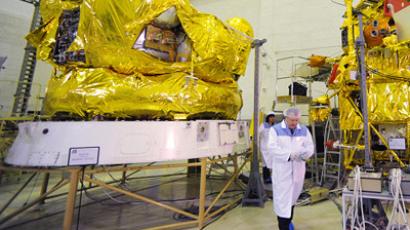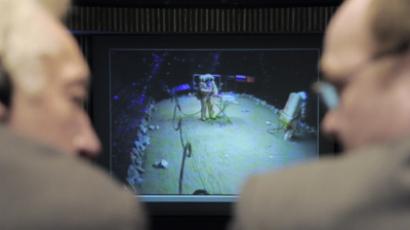Raising a foot to step on Mars: 17-month virtual trip over
The ambitious experiment simulating a manned mission to Mars is coming to an end on Friday, when the virtual space travelers will “land” back on Earth. RT has spoken to the head of the project Boris Morukov.
RT: Mr. Morukov, Mars-500 was your idea, and now the project will soon be over, and they will walk out of this chamber. How does it feel? It’s been 17 months. Are you anxious?Boris Morukov: Of course I'm anxious! We were more anxious, though, when they just walked in. Now we are looking forward to the end of the experiment. Of course, such extensive isolation will require the crew to spend some time in rehabilitation. It will be hard work for us to analyze the results. But the very fact that the team managed to stay the course is a source of delight. RT: From the very start, there has been much controversy over Mars-500, especially among professionals. Some people said that you can’t become a Formula 1 driver by spending a year and a half in the driver seat. Ordinary people who don’t know much about the experiment are likely to ask, what’s the purpose of spending $15 million to isolate six able-bodied men from the rest of the world for 17 months?BM: The purpose is as follows. The experiment has been designed to define the limits of human capacities. A mission to Mars is an idea that’s been on people’s minds for at least 50 years. Feasible projects of flights to the Red Planet were developed as early as in the 1960s. Then space exploration took a different course, but the beginning of the 21st century was again marked by a growing interest in flights beyond the [Earth’s] orbit, flights to other planets. It will put space science on a new level, in terms of technology, knowledge and extended limits of human capacities. The work on the International Space Station is viewed as a preparation for interplanetary voyages.RT: You say the experiment is supposed to define the limits of human capacities. But does it give you any specific answers like when can humans first reach Mars, who will be the pioneer to step on to its surface?BM: As a friend of mine once said, it’s not even the first step. We’ve only lifted our foot to take that first step. Before we decide on the equipment that will be used in a flight to Mars, we first need to have an understanding of the limits of the human body, its psychological and physiological capacities. Secondly, we need to decide on the amount of resources to be taken along, about the way our life support system will operate during such long missions. Communications between the crew and the Earth will be a different ball game. In orbital flights, much of the work rests on the shoulders of the specialists on the ground. An interplanetary mission is also characterized by autonomy, independence. You cannot turn back. It’s a totally different situation.And without testing and identifying the primary elements – the life support system, the volume of the resources needed, and human capacities – it’s difficult to make plans even on an initial design of a future spacecraft. Research in human capacities should go before the design of a spacecraft, though our scientists are quite active in designing new vehicles. This is an experimental facility. It can serve as a model or give us the data on the real size that will be needed for a real flight. Anyway, a mission to Mars will most likely consist of four crew, not six. The mission will need to cut the amount of resources that will be taken aboard.RT: The problem is the crew members know that in case of any emergency scientists can interfere at any point, unlike in space, and resolve it in a way that would be different to space conditions. Does this fact devalue the scope of the experiment?BM: No, it doesn’t, although this is a major factor. On a real trip you realize that you are away and you cannot make a U-turn, even if you wanted to, that you will take the road back only after you’ve reached the goal. In contrast, the crew locked up here is fully aware that they are not far away from the center of Moscow. It’s very hard to imitate this factor. But what we can imitate is the isolation from the outside world. Although at the same time we seek to keep some form of interaction between the crew and the world because it’s a kind of psychological support.One of the limitations we’ve introduced was the ban on direct real-time voice contacts. Only digital exchange of information was allowed. That limitation lasted for 420 days, and when voice calls were allowed again, their faces grew much brighter, it raised their mood a lot. Before that, they led a very isolated life. Of course, like on any space mission, they sought ways to vent their dissatisfaction, they made friends with the ground control dispatchers, they had friends and maybe even enemies. But in principle, this project was marked by a higher level of isolation. RT: What were the crew motivated by? What can encourage a person to stay away from their relatives and friends for 17 months? It’s not really a flight to Mars – the experiment won’t make them world famous and proud to be the first to land on Mars?BM: There’s a profession called a test engineer, and I think I could count myself as part of this group. It’s the people who are always one step ahead of what’s actually going on in space or in case of an emergency.RT: So they are enthusiasts helping mankind to move forward?BM: Not just enthusiasts…RT: Seventeen months is a pretty long period of life…BM: It’s really long… For me, too, I am among those who’ve been affected.RT: But they are surely paid enough money for that?BM: No, this is not big money, in my view.RT: Is it a secret? BM: No, it’s not. We’ve promised to pay 3 million rubles (about $97,500). We have agreed that the amount of compensation for the Europeans and Russians will be roughly the same. The Chinese agency employs different criteria. Anyway, the point I would like to underline is that it’s an international crew. There have been many concerns that they would split into groups according to the language. The Chinese member is a representative of a totally different culture, an ancient culture. RT: There was a report saying that three months before the experiment’s scheduled ending, the crew members stopped writing letters. Is that true and, if yes, what are the reasons?BM: They are very avid writers. Even now that they have an opportunity to make voice calls, at least with ground control, they still write letters, and write a lot.RT: So they never stopped writing?BM: Never. There was a moment though, which was during a scheduled emergency blackout, when any means of communication was cut off. They didn’t have access to any information. It only lasted a week.But you know the interesting thing about it was that they didn’t complain. They said they even liked it – it’s so quiet. They worked in an autonomous mode; they had instructions on how to behave, and a plan of action. RT: What do they usually write about? You just said these are long messages. What’s in them?BM: We have four information channels to transmit medical data, in-house information, scientific information accumulated for research and experiment and the space crew’s private correspondence. I learned that one person on the team is writing a book. I am not sure what is to become of it, but nevertheless…RT: What is the book about – the experiment?BM: Yes, the book is about the experiment. Excerpts of the crew's notebooks get published. This is what distinguishes Europeans from the representatives of Russian culture – they are used to describing their experience in blogs and on Live Journal pages. And, rather naturally, these publications generate massive response. The writers get a lot of information in response.RT: So the Europeans get some feedback from the public, do they?BM: Exactly. The public sends their messages to us first and we redirect them to the crew. There are two sides to this – a positive and a negative one. If the message contains some distressing reports, it may trigger a negative reaction.RT: What kind of news do the crew members receive? Do they know about the war in Libya, do they know that a tsunami almost wiped out Japan, or do you screen the information that’s coming to them?BM: They know. Global catastrophes are a major concern to them. For example, the news of the explosion at Domodedovo International Airport in Moscow was not delivered to them immediately. Despite the sadness of such reports, they should be delivered on time. Withholding information can trigger a negative reaction.RT: These people don’t get any sunlight; they’ve given up on their favorite occupations for quite a time. What kind of psychological impact does it all have on them? Is there a risk that the project’s participants will encounter some kind of psychological fallout later, when they’ve left the capsule?BM: I am not sure about the consequences but I do know that a person needs social rehabilitation after such experiments, because he practically drops out of his everyday life for quite a long time. I remember one case when a man was afraid of crossing the street after taking part in a long-term experiment. Such things happen. He returned back to normal later, of course, and even crossed the street running in inappropriate places.All I want to say is that such experiences always leave traces. A person gets used to living in a capsule, his life stereotype undergoes changes. Everything is planned for him by other people, though the crew are offered the opportunity to take their own decisions, or introduce changes, from time to time. But all the same, we rarely know what we will be doing in a week's time in real life, and there everything proceeds according to the plan.RT: Has any of the crew surprised you personally?BM: Yes, the Chinese participant surprised me. I was surprised by the smoothness with which he joined the team. He established good, stable relations with every crew member. There are always certain tensions between people – you can't help it – but he made really huge progress in the course of the experiment, it was almost visible. He became a professional. The Russian participants surprised me too, in a way. I should say we made the right choices when forming the crew. There was absolutely no dictator among the participants, no self-proclaimed commander. They based their relations on consensus, when you can talk and reach an agreement. Even if something has gone wrong and someone is dissatisfied, it is important to be able to put the common cause and interests of this small group of people prior to your own feelings and ambitions.RT: Does anyone of them have a chance of taking part in a real Mars mission?BM: It's a question of time. We don't know when it will happen.RT: Still we’ve been exposed to so many movies about Mars missions that it has become almost an obsession to colonize it. When do you think we will finally make it?BM: To inhabit Mars is not the same thing as to perform one space trip to Mars.RT: Let’s start with the first trip. You can’t colonize Mars without first landing on it.BM: It is technically viable. There are a number of projects and our designers are working on them. But whether we fly to Mars or not depends on two things: this space flight should be authorized and international cooperation should be established, because it won't be an accomplishment of one single nation or a group of people but rather of the entire global community.RT: Was it an intentional decision to leave women out?BM: No, it was not intentional; moreover, we had applications from women candidates. And in one of the preliminary tests we even had a female commander. There are two things that can account for the absence of women on the team: we did not make a point of the candidate's sex or make distinctions between men and women. We looked at the level of proficiency, character traits, the ability to work on a team and many other qualities.RT: But women are weaker?BM: No, there are different women. But personally I would be sorry to put a woman in such conditions because a man can break his daily routine much more easily than a woman, it applies to the private life, family and even the professional career. A woman cannot afford to lose so much time; she should never stop collecting points.RT: Mr. Morukov, thank you very much for the interview.BM: Thank you.















